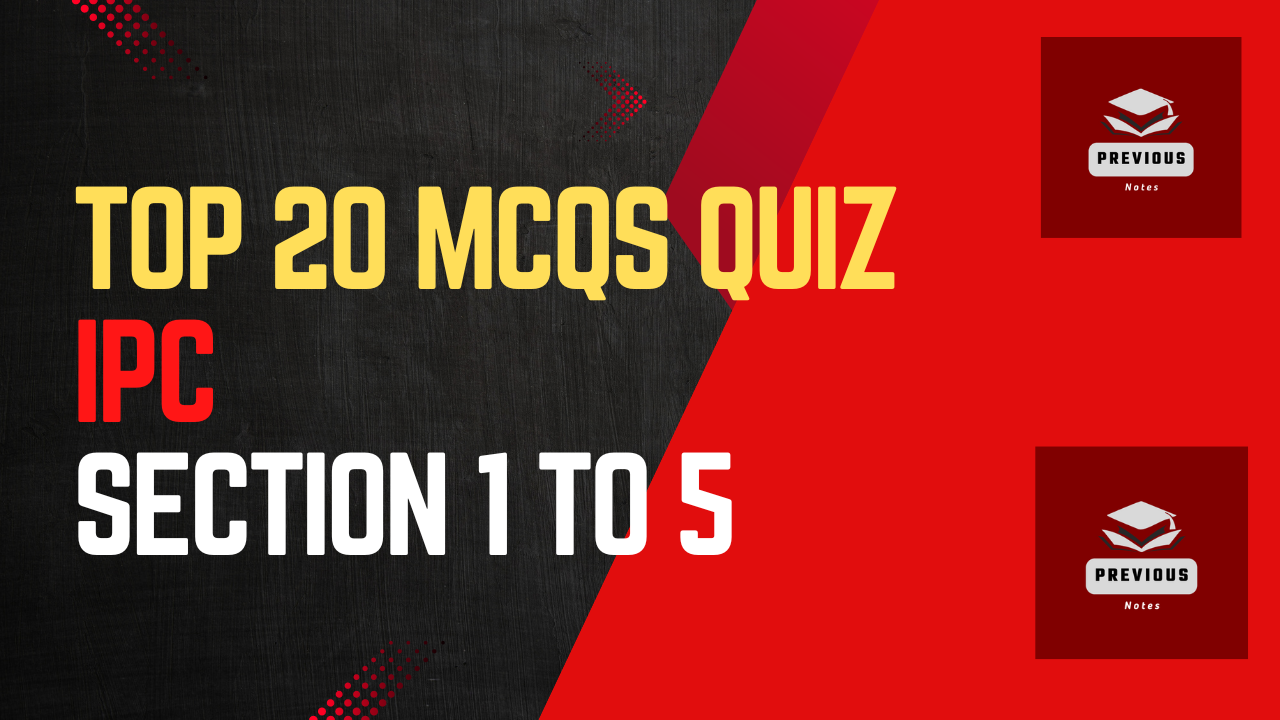Indian Penal Code MCQs
Section 1 to 5
Top 20 Indian Penal Code MCQs from Section 1 to 5 asked in various exams:
Indian Penal Code MCQs Quiz 1
Top 20 Indian Penal Code MCQs from Section 1 to 5 asked in various exams:
Question
Your answer:
Correct answer:
Your Answers
Important IPC MCQs Section 1 to 5:
CHAPTER I: INTRODUCTION
[Sections 1-5]
To which of the following is Indian Penal Code not applicable?
- (a) State of J & K
- (b) A foreigner committing offence in India
- (c) Offence committed on Indian Aircraft flying over territory of Japan
- (d) A foreigner committing offence in territorial water of India
- Ans. (a)
Which of the following statements about Indian Penal Code is true?
- (a) The Indian Penal Code applies to every person in any part of India for every act or omission contrary to the provisions of the Code
- (b) The Indian Penal Code applies to any offence committed by any citizen of India within and beyond India
- (c) Every such act committed outside India which if committed in India, would be punishable under the Indian Penal Code
- (d) All of the above
- Ans. (d)
Which section of the Indian Penal Code confers extra-territorial operation?
- (a) Sections 10 & 11
- (b) Section 14
- (c) Section 11
- (d) Sections 3 & 4.
- Ans. (d)
A national of Pakistan fires from the other side of the borders and a person within the Indian border is killed. The relatives, friends and other Indians rush and drag the Pakistani to border Indian Police Station Can the Indian courts try the accused for murder?
- (a) No, Indian courts have no jurisdiction
- (b) Yes
- (c) He shall be handed over to the Pakistani authorities for trial in Pakistan
- (d) None of the above
- Ans. (b)
‘A’, a Spanish citizen, who was residing in Paris, instigated the commission of an offence which in consequence was committed in India. Can he be held liable?
- (a) He is liable as the offence was committed in India
- (b) He is liable since the Indian Penal Code also extends to extra-territorial acts
- (c) He can be held liable because the offence was to be committed in India
- (d) He cannot be held liable because instigation was not given on Indian territory
- Ans. (a)
Admiralty jurisdiction does not extend over
- (a) Offences committed on Indian ships on the High seas
- (b) Offences committed on foreign merchant ships in Indian territorial water
- (c) Offences committed on foreign warships in Indian territorial water
- (d) Piracy
- Ans. (c)
A’ who is a citizen of India, commits a murder in England. He is found in Indore and arrested accordingly. Where can ‘A’ be tried?
- (a) at New Delhi, the capital of India
- (b) at Bhopal, the capital of M.P.
- (c) at Indore, where he was found
- (d) at any place in India
- Ans. (c)
A an Indian citizen commits adultery in England, which is not an offence in the country The alleged offence can be
- (a) The court within whose local jurisdiction the adultery committed
- (b) The court of Judicial Magistrate first class situated at any place in India at which he may be found
- (c) International court of Justice
- (d) The Supreme Court of India
- Ans. (b)
‘A’, an Indian citizen commits murder in Uganda. Where can he be tried and convicted of murder?
- (a) Only in Uganda
- (b) Only in that country of which the deceased was a citizen
- (c) In any one of the above
- (d) In Delhi
- Ans. (d)
A citizen of India committing an offence outside India may be tried under IPC, 1860. (True or false)
- (a) true
- (b) false
- Ans. (a)
Under which of the following situations would the Indian Courts have jurisdiction?
- Crime committed by an Indian in a foreign country
- Crime committed by a foreigner in India
- Crime committed by a person on an Indian ship
- Ans. (d)
The provision relating to extension of Indian Penal Code to extra-territorial offences is provided in Section of the Indian Penal Code:
- (a) 4
- (b) 5
- (c) 6
- (d) 7
- Ans. (a)
Who are not exempted from intra-territorial Jurisdiction of the Indian Penal Code?
- (a) The President of India and the Governor of States
- (b) Public
- (c) Foreign Ambassadors
- (d) Alien Enemies
- Ans. (b)
Who amongst the following is exempted from the application of Indian Penal Code?
- (a) President of India
- (b) Diplomats
- (c) Alien enemy
- (d) All of the above
- Ans. (d)
The Indian Penal Code, 1860 came into enforcement on:
- (a) October 6, 1862
- (b) January 1, 1862
- (c) October 6, 1860
- (d) January 1, 1860
- Ans. (c)
Which one of the following sections of the IPC defines its intra-territorial jurisdiction?
- (a) Section 4(1)
- (b) Section 4(2)
- (c) Section 2
- (d) Section 3
- Ans. (c)
Indian Penal Code MCQs Quiz 1
Top 20 Indian Penal Code MCQs from Section 1 to 5 asked in various exams:
Question
Your answer:
Correct answer:
Your Answers


















Leave a Reply